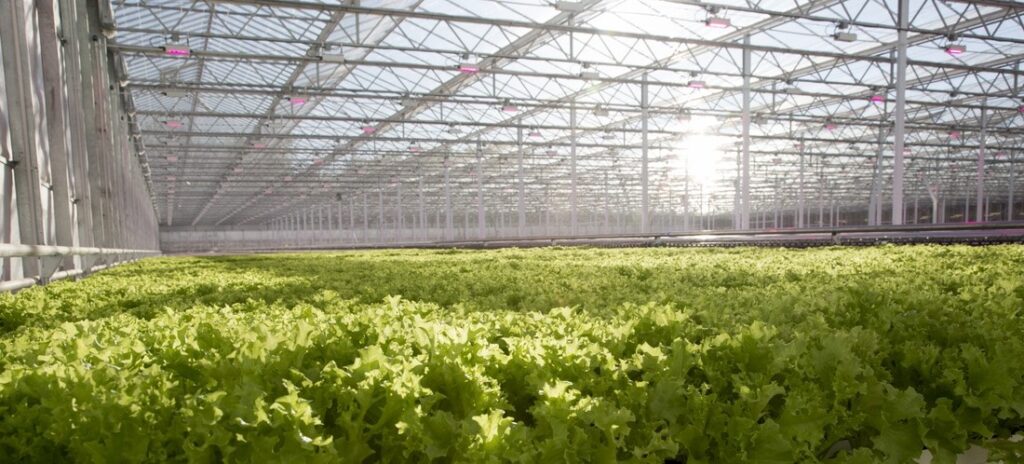
Little Leaf Farm’s greenhouse in Devens, MA.
Little Leaf Farms is a three-acre greenhouse operation run by Paul Sellew, Pieter Slaman, and Tim Cunniff in Devens, Massachusetts. Little Leaf Farms grows their greens hydroponically indoors all year round and is dedicated to producing sustainable, nutritious and fresh greens. 95% of the lettuce greens we consumed in Massachusetts are grown in California and Arizona. Not only is all of this produce trucked thousands of miles, California has been suffering from an extreme drought for over five years. Little Leaf Farms is proud to provide New England with sustainable greens that are produced locally and reach their consumer within only a day of being cut.
We spoke to Paul Sellow, the Owner and CEO of Little Leaf Farms for more information about their approach to local food production. Farming has always been a part of Paul’s life. He grew up on a New England farm called Pride Corner Farms and graduated from Cornell with a degree in Horticulture. Paul has created a few farming operations in addition to Little Leaf Farms, and started his first company at only 24 years old.

Pictured from left to right: Paul Sellew- Owner, Pieter Slaman- Grower, and Tim Cunniff– Sales and Marketing.
Paul believes that “technology has an important future in constantly innovating and dealing with issues around sustainability.” Paul argues that controlled systems like greenhouses can increase the capacity of our local food system while withstanding the impacts of climate change. Little Leaf Farms have a rainwater collection system which allows them to utilize 90% less water than field-grown lettuce, making their operation more resistant to drought. Little Leaf is also currently working with Dwayne Breger and the UMass Clean Energy Extension Program to create a plan for their greenhouse to use energy that is normally wasted to heat and cool their greenhouses.
| Most business owners believe that they must choose between protecting the planet and making a profit. Paul, however, has found that “sustainability and a viable business enterprise are not incompatible. We try to use natural systems in a way that is economically efficient and better for the environment.” Paul explained that Little Leaf’s sustainable initiatives actually save them money. |
| For example, their captured rainwater system gives them access to water for free has saved them the economical and energy expenditure of drilling a well or installing a pump. Little Leaf also uses biological controls instead of chemical sprays. They release predatory insects into their greenhouses to feed on the pests that disrupt their plants instead of using pesticides. Speaking to Paul, it was obvious that everyone at Little Leaf Farms loves what they do and really believes in their mission. Paul said to me, “We are doing something that is really important- we are feeding people.” It is clear that they take that responsibility seriously. |
Our thanks to Paul for taking the time to speak with us. For more information about Little Leaf Farms, visit their website.
“Sustainability and a viable business enterprise are not incompatible. We try to use natural systems in a way that is economically efficient and better for the environment.” -Paul Sellew
